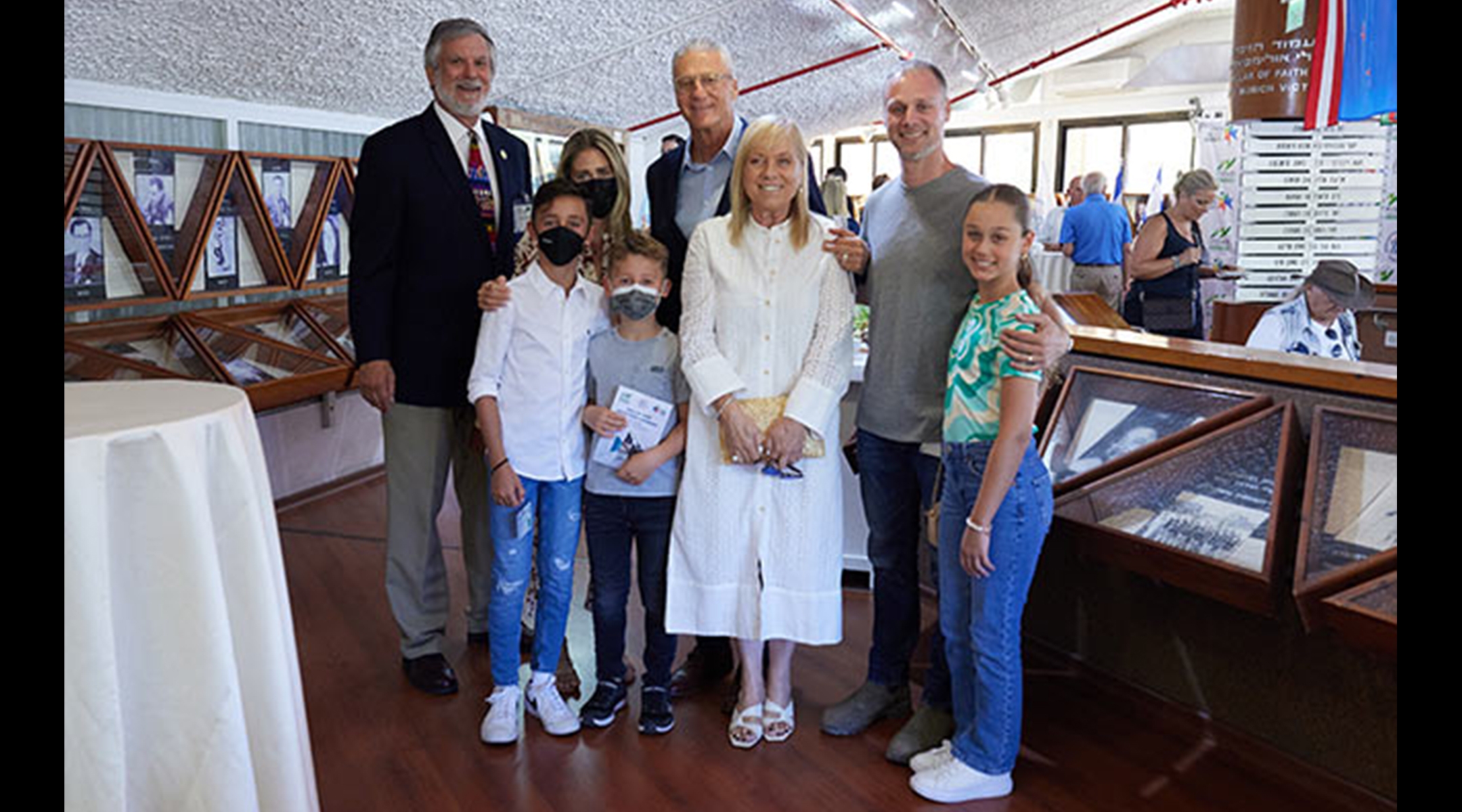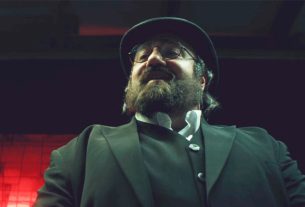(JTA) — On one wall of the dining hall at the Indiana University Hillel sit 36 framed photographs of Jewish alumni who have made an impact in the sports industry, from athletes to executives. It’s the IU Jewish Sports Wall of Fame.
One of those pictures is of Josh Rawitch, who has had a long career as an executive in baseball. At first, Rawitch told the Jewish Telegraphic Agency, he questioned whether he was truly worthy of being honored alongside fellow Hoosiers like Mark Cuban, the billionaire businessman and owner of the NBA’s Dallas Mavericks, and Ted Kluszewski, a four-time All-Star with the MLB’s Cincinnati Reds in the 1950s.
But then Rawitch thought about the location of the wall, and who it might impact.
“You’re going to have young people, 18, 19 years old, walking in there looking at the wall, seeing all these people who are up there who have gone on to do significant things in the industry,” Rawitch said. “That’s actually pretty cool. That actually inspires them. If I was 18 and I’d have walked in and that wall had been there when I was a freshman, I would have thought, ‘that’s really cool.’ I would love to be like one of those people someday.”
Rawitch knows a thing or two about halls of fame: He’s the president of the National Baseball Hall of Fame and Museum in Cooperstown, New York. He said institutions like the one he leads are important “repositories for history.”
“I think having a hall of fame of any kind in any city essentially does two things — it honors people who are really good at what they do, and it documents the history of what’s gone on in that industry,” he said.
The Indiana University Jewish Sports Wall of Fame, located in the dining hall at Indiana University Hillel. (Courtesy)
The display that honors Rawitch in Bloomington is just one of many halls, walls and exhibits across the United States and the world — many of them small — that honor Jewish greatness in sports. From Southern California to Philadelphia, St. Louis to Washington, D.C., similar organizations and institutions recognize Jewish athletes, coaches, executives, media members and beyond.
Why so many?
“We want to call attention to that because of the antisemitic trope that Jews are not good soldiers, farmers or athletes. We need to overcome that,” said Jed Margolis, who runs the International Jewish Sports Hall of Fame in Israel, which has honored over 400 athletes since 1981 and is housed in Netanya after being founded in the United States. “It’s simply not true. And telling the stories out there will help inspire people and lay to rest some of those falsehoods which I think are important to overcome.”
In the fight against antisemitism, Steve Rosenberg, who chairs the Philadelphia Jewish Sports Hall of Fame, said “the best defense is a good offense.” The Philadelphia hall, which inducted its first class in 1997 and has moved locations multiple times, has 183 total inductees, including former NFL tight end Brent Novoselsky and longtime 76ers broadcaster Marc Zumoff.
“We shine the light on the great accomplishments of Jews in sports. And we need to do more of that in the world,” Rosenberg said.
Rosenberg added that he thinks there should be even more halls of fame, for Jewish actors, architects, poets and so on, “so that we can celebrate our accomplishments, not in the way that we pat ourselves on the back, but that we can talk about all the great things that we do as a people.”
For Craig Neuman, the chief programming officer at the St. Louis Jewish Community Center, a key feature of Jewish culture is the sense of connection Jews feel when they discover that a celebrity is Jewish. That sense of pride is clear in the work Neuman does with the St. Louis Jewish Sports Hall of Fame, which has its own hallway at the JCC.
“I can’t imagine any other place in the world where you would say, ‘I feel connected to this other country, or these other people, by sheer virtue of our religion,’” Neuman said. “There’s some pride that’s involved with that.”
Like the Baseball Hall of Fame in Cooperstown, the International Jewish Sports Hall of Fame seeks to recognize the most elite athletes — Jewish world record holders, Olympians and the like. Or, as Margolis put it: “We’re looking for the best of the best: the Hank Greenbergs, the Mark Spitzes, people like that.”

Jed Margolis, left, with former Israeli basketball star Mickey Berkowitz, back center, and his family, at the International Jewish Sports Hall of Fame in Netanya, Israel. (Courtesy of the International Jewish Sports Hall of Fame)
At the local halls of fame, the criteria are different. Rawitch likened it to the dynamic between national versus state and local politics.
“As the National Baseball Hall of Fame, I think it’s pretty clear that we are honoring the absolute greatest who ever played or worked within the game of baseball nationally,” Rawitch said. “Clearly, that should be harder to get into than, say, the California Baseball Hall of Fame or the New York Baseball Hall of Fame. But I don’t think it should diminish if you’re a recipient of that. It should be an honor for anybody who’s named to any sort of hall or wall of fame.”
Inclusivity is central to the local halls of fame.
“I think we want to, on some level, send a message that says, ‘hey, just because you’re not in Cooperstown doesn’t mean that you didn’t have an impact in the world, on your sport, in your community,’” said Neuman.
But that doesn’t mean the standards for entry aren’t high. In fact, in St. Louis, candidates for induction must possess more than just athletic accomplishments — there’s also the “mensch factor.”
“When you are in a position where people might look up to you because of some accomplishments, and whether it’s because you’re an athlete, or you’re a politician, or a lawyer or whatever the profession that puts you in the public’s eye, there’s a certain responsibility that comes along with that,” said Neuman. “It’s a great example to set that, yeah, this guy was a great baseball player, but he was also a great human being as well.”
The St. Louis Jewish Sports Hall of Fame has 84 members inducted across eight classes dating back to 1992 — including Chicago Cubs ace Ken Holtzman and basketball legend Nancy Lieberman. The last group was enshrined in 2018.
Many of those inductees represent more than the typical professional sports — baseball, basketball, football, soccer and hockey. There are racquetball and handball players, even a hot air balloonist. (Whether that counted as a sport was a topic of debate for the selection committee.)
In Philadelphia, a similar conversation was held around whether poker should qualify — in that case, poker was allowed, but it turned out the candidate in question wasn’t actually Jewish.
For Rosenberg, recognizing people from a diverse range of sports is an important part of the work, especially as he works to engage younger members of the community.
“I want the young people, particularly the young Jews, to know that there’s a place for you, no matter if you’re a golfer, a swimmer, a gymnast, a baseball player, whatever you want to do, that you can go on to achieve greatness and that greatness will be recognized,” Rosenberg said.
He added that very few people stop by the hall of fame.
“The reality is, if I stood at the hall of fame on any given day, people that are coming in just to see the hall of fame, we couldn’t get a minyan,” Rosenberg said, referencing Judaism’s 10-person prayer quorum. “Maybe over the course of a year. But we do get the sort of incidental traffic, people that are going to the JCC for other activities.”

The Philadelphia Jewish Sports Hall of Fame. (Courtesy)
The Philadelphia hall’s journey to the JCC was not a simple one. The collection used to have a permanent space at a local YMHA, featuring typical sports artifacts like bats and jerseys. Then it moved into the Jewish federation building — until September 2021, when Hurricane Ida caused severe flooding that destroyed much of the hall of fame’s memorabilia. The current exhibit at the JCC is more two-dimensional, Rosenberg said.
One of the Philadelphia inductees is Arn Tellem, the vice chairman of the NBA’s Detroit Pistons and a longtime agent who represented A-list athletes like Kobe Bryant. Throughout the 2000s, Tellem was regularly ranked among the top agents in all of sports, and he is a member of the Southern California, Michigan and Philadelphia Jewish Sports Halls of Fame.
By the time Tellem got the call from the Philadelphia hall in 2015, he had received his fair share of recognition. But that didn’t make this honor count any less for the Philadelphia native. Rosenberg said Tellem “couldn’t wait to come” to the ceremony, bringing three tables worth of supporters with him.
“Arn Tellem isn’t doing this for recognition, or for money, or for fame,” Rosenberg said. “He has that. It means something to him.”
That sentiment seems to be shared by honorees from across the halls. Rosenberg added that he has seen some inductees moved to tears by the news. When Chris Berman, the ESPN broadcaster who has anchored the network’s flagship program “SportsCenter” since a month after it launched in 1979, was honored by the International Jewish Sports Hall of Fame, he was “very touched,” said Margolis.
Lauren Becker Rubin, a former star lacrosse and field hockey player at Brown University, was inducted into the Philadelphia Jewish Sports Hall of Fame in 2018.
“It was a big honor for both me and my family,” Becker Rubin told JTA. “I think the connection of celebrating both the athletic achievement and the community makes it meaningful on another level.”
Becker Rubin, who is now a mental performance coach, is also a member of Brown’s athletic Hall of Fame for setting numerous school records in both sports during her college career. But being recognized by her local Jewish community was a particularly special honor, she said.
After her induction, Becker Rubin joined the hall’s board. “Celebrating positive achievements and putting out positive messages about Jewish athletes is a good counter to the negative rhetoric that is out there,” she said.




